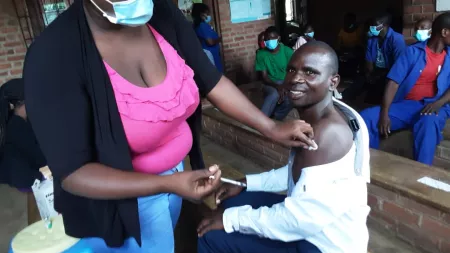"Since Corona hit, we have been affected a lot, we cannot travel freely to collect items for business, convening in groups to discuss issues and share thoughts and idea stopped, skills-building workshops that used to happen before are no longer there because organizations cannot travel to us, many girls are getting pregnant and married because of the closure of schools, there has been an increase of crime by men and a lot of alcoholism. Things are not going well."Ganizani Dalison, age 26, Ntcheu district
To address the situation of Ganizani and his peers, CARE’s Community Score Card amplifies voices of young people and other marginalized groups, elevating real-time data from local to national levels to inform reproductive health policy and planning during COVID-19.
What changed with Community Score Card during COVID-19?
- Budgeting in response to community priorities, even in crisis: The national government listened to community feedback supported by national coalitions and increased the family planning budget instead of decreasing it. CSC enabled sharing of real-time data, connecting the local to national level policy, decision making and budgeting.
- Increasing supplies at community clinics: After hearing that the lack of stocks at community clinics was a big concern—especially for youth—the government launched new plans to get personal protective equipment and family planning/other SRH supplies to clinics.
- Opening new spaces for inclusive dialogue and keeping the conversation going: Based on feedback from 1 Community Scorecard processes, the team organized call-in radio dialogues where young people, community members, and service providers could talk to district health officials. Using new digital methods, the Community Score Card was able to support 73 community representatives in a rigorous discussions in Ntcheu, Malawi to connect to their local governments to express concerns and build a bridge, even when they couldn’t get there in person.
- Re-activation of Malawi’s community-based and youth responsive services: After hearing about the impact of COVID on community-level services and youth access to services, the government of Malawi’s Reproductive Health Department, re-launched the cadre of community based distribution agents (87 of whom were data on community data collection on family planning and maternal newborn health) including youth agents to enable peer to peer outreach. In addition to increased deployments, it led to increased capacity building on youth friendly health services, increasing the number of youth friendly facilities from 17 to 31 out of the 39 facilities in the district.
- Prioritize health worker voices: In a context where community health workers (who are 70% women) have invaluable insights about what’s happening for patients, but usually don’t have a seat at the table when decisions get made, this tool helped over 600 health workers influence high-level decisions affecting approximately over four hundred thousand people.
How did it happen?
- Build on a trusted tool: CSC has been implemented for nearly 20 years and has grown to 15 countries and 10 sectors. CSC enables collaboration between responsible power holders (such as government decision makers or service providers) and empowered citizens (such as community members and service users) through participatory dialogue.
- Go mobile when you need to: When COVID-19 era lockdowns and mobility restrictions limited the ability of different stakeholder groups to meet, CARE set up an SMS platform and Whatsapp groups through which groups of women, men, young people and community leaders shared what they were experiencing and hearing about in their communities in terms of access and quality of SRH services and also COVID-19 related services. We set up similar virtual groups with Service providers.
- Amplify local voices: Through this, we heard from different groups including community members including youth groups and health workers about the realities of accessing SRH and FP services during COVID-19 including information about stock-outs of contraceptives, reports of a halt in community outreach clinics which in turn affected youth access to contraceptives, fears and misconceptions about covid and stories about how so many community health workers were becoming sick from covid. CARE’s collaboration with other local Civil Society Organizations and our representation of CSOs at the national level through the Family Planning 2020 forum, enabled elevating this information from the local to the national levels.
- Work with youth leaders: Youth groups in Ntcheu continue to use CSC to improve quality of youth responsive services in health facilities, far beyond specific projects. CARE leveraged their leadership capacities and deep linkages with their communities to identify unique impacts of COVID-19 on young people and invest in additional youth leadership to overcome these issues. Youth groups have leveraged the CSC platform to work in the education sector to promote school retention to address high school drop out rates among adolescent girls and reducing child, early and forced marriage in their communities. They’ve also advocated for applying CSC to the agriculture sector and for natural resource management.
- Get creative: As transparency and getting all stakeholders on the same page is critical to the process, we synthesized this feedback and organized a call-in radio dialogue between community members, frontline service providers and district health officials in Ntcheu, Malawi which was also aired nation-wide.
Pandemics start and end with communities. Meaningful citizen engagement must be built into national vaccine readiness and roll-out frameworks. Invest in Community Score Card and other social accountability approaches now to get feedback from community on concerns and hesitancy around vaccines, so that these networks can be maintained during vaccine roll-out to maintain the feedback loop for fair, fair and equitable roll-out, addressing rights violation and discrimination.
